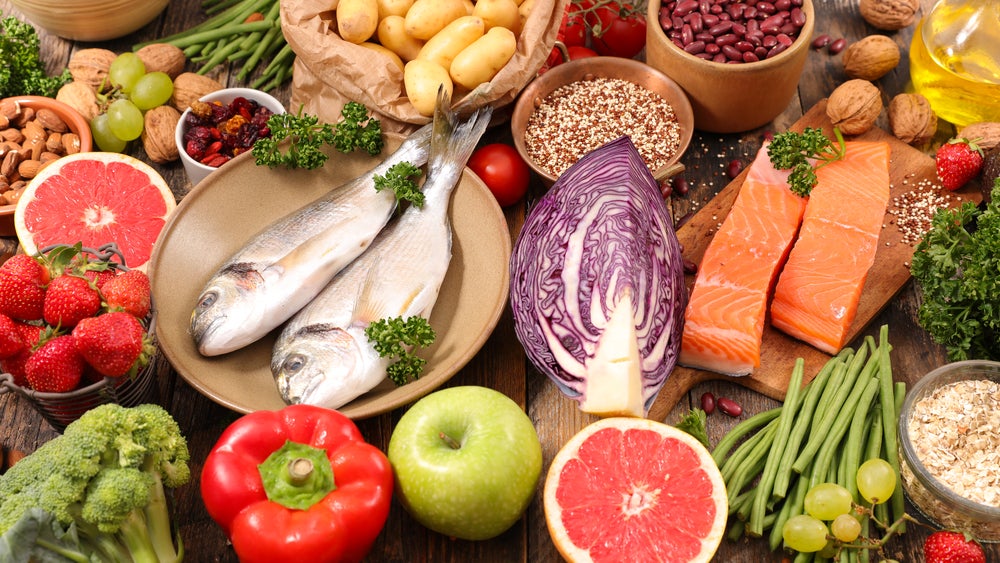8 Nutrition Tips To Help You Kick-Start the 2020 Season

Photo: Shutterstock.com
The holidays are over, the new year is here, and the “off-season” is quickly coming to an end. It’s time to start thinking about how you’re going to fuel for the upcoming season—and we’re here to help. Here we’re sharing eight helpful tidbits from some of our favorite nutritionists. Happy fueling and training!
1. Focus on the overall quality of your diet
According to Racing Weight author Matt Fitzgerald, the best way to reduce your calorie intake without compromising your training is to focus on the quality of what you eat instead of on the quantity. Calorie for calorie, foods such as vegetables, fruits, nuts and seeds, whole grains, lean meats and fish, and dairy offer greater satiety and more total nutrition than low-quality foods. So by increasing the overall quality of your diet you will reduce your calorie intake without failing to meet your body’s demands and without the need to count calories.
2. Ramp up your weight loss efforts before the season
Coach Lynda Wallenfels shares that many athletes get the timing of trying to lose weight wrong. You have more flexibility with nutrition during lower intensity off-season and base training periods. Once you have moved into your higher intensity build, peak and race periods, your fueling and recovery demands are too high to maintain a calorie deficit while building fitness. Don’t wait until eight weeks before your peak race or assume the weight will just come off while training. That only happens to a lucky few with the right genetics. The rest of us need to take action by following a detailed plan to achieve our optimal race weight.
3. Have a (meal) plan
As a hard-charging triathlete, you probably spend a big chunk of your time planning (and anticipating!) your next meal or snack. Having a food plan that is time-efficient and can healthfully satiate your appetite is key. This seven-day plan from chef Jessica Cerra takes the guesswork out of mealtime and can help you happily eat your way to an ideal race weight.
4. Remember you can never out-train a poor diet
Using junk food as a reward for long hours in the saddle or for the hard yards in the pool is pretty common, but you’ll never improve body composition or race splits through good training followed by unhealthful, over-indulgent eating. Reconsider the way you think about the reward relationship with food, says former pro triathlete and nutritionist Pip Taylor. You will feel and perform better when (re)fueling your workouts with fresh, whole foods, and those cravings for nutritionally void reward-based foods will gradually dissipate, especially when you see the changes to your body from omitting them.
5. Don’t let your busy schedule become an excuse
When it comes to cooking and preparing food, no matter our good intentions, we often fall back on fast food or take-out. And now with a great many more options readily available to-go, it is often a viable option for eating well. However, it is also used too readily as an excuse, and with a few exceptions, you are better off preparing your own food and being in control of the contents of the food going into your body. With a little knowledge, a little planning and a little creativity, you should be able to quickly and easily put together a balanced meal in minutes. Pip Taylor shares the staples you should have in your pantry and quick meals you can throw together quickly here.
6. Watch how much alcohol you consume
We realize this one is a bit of a buzz kill (literally!), especially coming off of a fun holiday season—but it is an important reminder. Nutritionist Monique Ryan writes that it’s important for an athlete to use alcohol sensibly, as it does not play any role in physical recovery and could have mild to serious detrimental effects upon performance. It also tends to be very high in empty calories and can interfere with how your body uses vitamins and minerals. Bottom line, know your limits, and be aware of how they change with your training and fitness level.
7. Avoid the “diet cults”
Many popular diets have cult-like features. This is no accident, says Matt Fitzgerald.
Food has always been more than mere sustenance for humans. It is also a source of social and moral identity. Since as far back as the Kosher dietary laws of the ancient Hebrews (and probably much earlier), human beings have formed group identities and derived a sense of moral superiority from eating by strict rules. This instinct has become so deeply ingrained in human nature that, according to research by Yale psychologist Karen Wyn, infants as young as three months old express disapproval of others who seem not to share their food preferences.
Ostensibly, most modern diets are all about health. But in fact they are just as much about group identity and moral judgment as were the diets of the past. If your diet has these five characteristics, it is what Fitzgerald calls a diet cult. These cult diets can be perfectly healthy, but you’re ultimately better off focusing on the overall quality of your diet (see No. 1).
8. Inadequate calorie intake during training is no way to lose weight
Nutritionist Lauren Antonucci sees triathletes make this mistake repeatedly, either to “save calories in an attempt to drop a few pounds,” or to “practice going on empty.” Studies show both mindsets are completely backward. Take in 30–60 grams of carbs/hour (up to 80–90 grams/hour for Ironman athletes) to fuel your hardworking muscles and maximize your workout effort. Want to practice mental toughness? Do one of your 100-mile rides solo or train in less-than-ideal weather—don’t train on empty. Bonus: Adequately fueling during training will also curb your hunger later, which translates to calories saved at the end of your day—a much smarter way to drop a body fat percentage point or two!